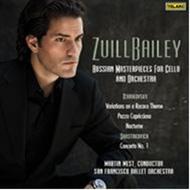
Russian Masterpieces for Cello
£11.88
In stock - available for despatch within 1 working day
Despatch Information
This despatch estimate is based on information from both our own stock and the UK supplier's stock.
If ordering multiple items, we will aim to send everything together so the longest despatch estimate will apply to the complete order.
If you would rather receive certain items more quickly, please place them on a separate order.
If any unexpected delays occur, we will keep you informed of progress via email and not allow other items on the order to be held up.
If you would prefer to receive everything together regardless of any delay, please let us know via email.
Pre-orders will be despatched as close as possible to the release date.
Label: Telarc
Cat No: CD80724
Format: CD
Number of Discs: 1
Genre: Orchestral
Release Date: 6th April 2009
Contents
Works
TchaikovskyVariations on a Rococo Theme, Op.33
Tchaikovsky
Pezzo capriccioso in B minor for Cello and Orchestra, Op.62
Tchaikovsky
Nocturne in D minor for Cello and Small Orchestra, Op.19, No.4
Shostakovich
Cello Concerto No.1 in E flat major, Op.107
Artists
Zuill Bailey (cello)San Francisco Symphony Orchestra
Conductor
Martin WestWorks
TchaikovskyVariations on a Rococo Theme, Op.33
Tchaikovsky
Pezzo capriccioso in B minor for Cello and Orchestra, Op.62
Tchaikovsky
Nocturne in D minor for Cello and Small Orchestra, Op.19, No.4
Shostakovich
Cello Concerto No.1 in E flat major, Op.107
Artists
Zuill Bailey (cello)San Francisco Symphony Orchestra
Conductor
Martin WestAbout
Zuill Bailey’s rare combination of compelling artistry, technical finesse and engaging personality have secured his place as one of the most sought-after cellists today. Bailey performs regularly with long-time duo partner, pianist Awadagin Pratt, as well as with pianist Simone Dinnerstein. He is also a member of the acclaimed Perlman-Schmidt-Bailey Trio, which also includes pianist Navah Perlman and violinist Giora Schmidt.
The voice of the cello is uniquely suited to the qualities of passion and melancholy that makes Russian music so provocative to listeners. Tchaikovsky’s Rococo Variations was written for the German-born cellist Wilhelm Fitzenhagen, a professor at the Moscow Conservatory. When Tchaikovsky left Russia for a lengthy stay in Western Europe, he gave Fitzenhagen a free hand in composition, which resulted in significant structural alterations to the piece. The cellist premiered his version of the Rococo Variations at a Moscow concert conducted by Nikolai Rubinstein in 1877. Tchaikovsky was displeased with the alterations, but later said, “The devil take it. Let it stay as it is.” The Fitzenhagen score is heard in Bailey’s rendition, and is considered an effective presentation of Tchaikovsky’s material.
Shostakovich wrote his first Cello Concerto in 1959 for the distinguished cellist Mstislav Rostropovich, who had frequently performed Shostakovich’s Sonata for Cello and Piano with the composer at the piano. It was premiered in Leningrad with the Leningrad Philharmonic and Rostropovich. When Shostakovich gave his only public performance as a conductor in 1962, the Concerto appeared on the programme.
Error on this page? Let us know here
Need more information on this product? Click here